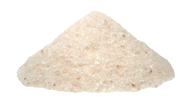 Sea Salt, For Better Health
Sea Salt, For Better Health
 "Sea salt" or "solar salt" is harvested directly from an ocean or sea, usually by channeling sea water into large trays and allowing the sun and wind to evaporate it naturally. Sea salt still contains traces of minerals including iron, magnesium, calcium, potassium, manganese, zinc, and iodine, while common table salt is mined from large salt flats from which some minerals washed away and contaminates may have entered. Proponents of sea salt rave about its bright, pure, clean flavor, and about the subtleties attributed to its trace minerals. It generally takes LESS sea salt to attain the same level of saltiness in food. Also, it contains about 16% LESS SODIUM than common table salt.
"Sea salt" or "solar salt" is harvested directly from an ocean or sea, usually by channeling sea water into large trays and allowing the sun and wind to evaporate it naturally. Sea salt still contains traces of minerals including iron, magnesium, calcium, potassium, manganese, zinc, and iodine, while common table salt is mined from large salt flats from which some minerals washed away and contaminates may have entered. Proponents of sea salt rave about its bright, pure, clean flavor, and about the subtleties attributed to its trace minerals. It generally takes LESS sea salt to attain the same level of saltiness in food. Also, it contains about 16% LESS SODIUM than common table salt.
Those who have not replaced processed common table salt with organic sea salts do not yet realize that, like all spices, different salts provide different flavors. Each salt has its unique taste due to its mix of minerals and crystal variations. The selection of salt is an important decision of some of the world's great chefs and finest restaurants. They pay more for better ingredients that yield better taste, and fine sea salts are often at least one of their "secret ingredients”. Diversity in salt selection also prevents all their food from tasting the same.
Our sea salt is harvested from the Pacific Ocean, as opposed to sea salt from the coastal areas of foreign countries along the Mediterranean Sea, North Sea, and Atlantic Ocean. Nothing appears wrong with those waters, but US FDA regulations govern American food grade sea salt, while sea salt of foreign origin may not approach the standards of US FDA Food Grade.
There are several authentic sea salts, but also hundreds of lesser quality or even bogus sea salts. Some falsely advertise that spicing and/or treatment of the salt was done to affect its flavor. A lot of French sea salts don't even include actual sea salt at all, and there is no such thing as natural "Celtic" or "smoked" sea salt.
The most fundamental and highly used spice is salt. While excessive salt intake is harmful, having no salt isn't wise since salt is a natural adversary to fungus, bacteria, and viruses. Medical studies reveal many health benefits in switching from common table salt to sea salt, mostly due to decreased sodium content. Aside from better taste, reducing sodium in your diet by switching to sea salt improves chances of avoiding heart and circulatory problems. If you already have those problems, you'll be doing something about it. So live long, my friends, and bon appetit ! Be sure to also try our several blends of Cajun Seasoning, all dedicated to including this high quality sea salt.

Michael's Dis 'N Dat Cajun Seasonings
div. of Babineaux Design Associates, Inc.

